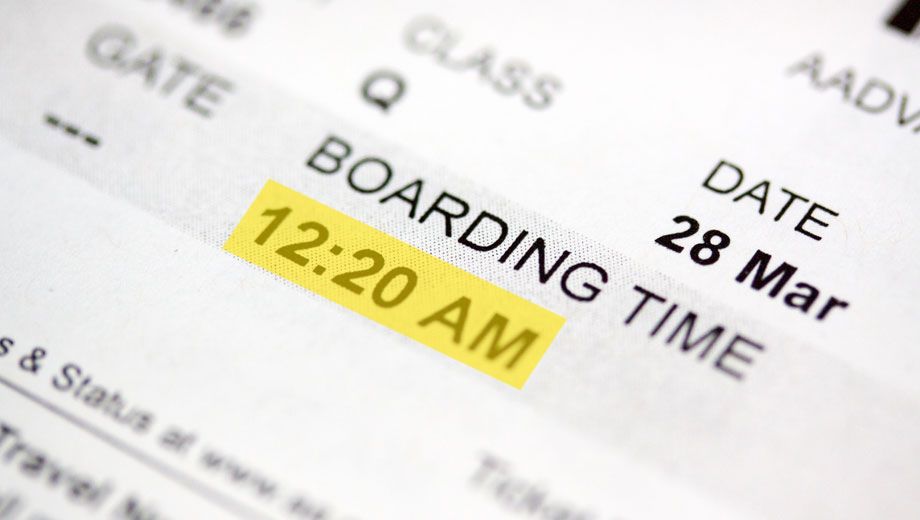Red-eye flights leave late, arrive early, cross several time zones and don't give you enough time for a proper sleep.
Whether it's Perth to Sydney, Los Angeles to Washington DC, or New York to London, these overnight flights are a one-way ticket to exhaustion -- especially when you're travelling in economy class.
You've stepped onto the plane after a full day's work, and the very next morning you'll walk off to face another but without the benefit of a good night's sleep in-between.
Here are our top five tips for surviving that overnight red-eye in economy.
1) Order a special meal so you're served first
We'd really suggest eating in the airport before getting on the plane, so you can sack straight out and get the best chance for maximum rest.
But if time is against you or you want the option of scoffing something on board, take advantage of the meals offered for special dietary requirements such as vegetarian and Halal. These are the first to be served in economy class, ahead of the main 'chicken or beef?' meals.
Order a special meal gets you served first, and you can then get on with the serious job of trying to sleep. The vegetarian or vegan meal is often a lighter meal anyway, which is always a plus when travelling to avoid the feeling of a bloated stomach.
However, note that you have to order this in advance (it can be done online) rather than when you set foot on the plane.
2) Pick the seat you'll sleep best in
Some people sleep better in a window seat, rolling up a jumper for a pillow and leaning against the side of the plane. Others swear by an aisle, with the ability to get up and move around, and avoid feeling hemmed in.
Whatever you pick, use our guide to getting extra legroom in economy class to get the most space for your sleep.
3) Pre-hydrate so you don't dehydrate
Common advice for flights is to keep yourself hydrated by drinking plenty of water. But on a red-eye, this is generally a bad idea: you don't want to be jumping up to go to the loo in the middle of the night (and anyway, most people have trouble drinking in their sleep).
Instead, keep yourself well-hydrated until you reach the airport and nip to the loo just before boarding. Also, skip caffeinated drinks -– tea, coffee, cola –- for at least eight hours before your flight to avoid staying awake on the plane.
It also helps to know your own body: do you pass out after a glass of wine on the plane, or does it keep you blearily awake for the flight? Choose your drinks with dinner accordingly.
And when the drinks come around on the trolley, ask for an unopened can of something caffeinated to drink later on in the flight, when you're bleary-eyed and need a jolt to get you moving before landing. Or if you're really in need of a pre-landing pick-me-up, try packing one of those concentrated small 'energy shot' drinks in your carry-on bag.
4) Put something in your ears
There's nothing like a screaming child or someone with a voice like a cheese-grater two rows away to keep you awake when you need to be asleep.
Pack earplugs, or a pair of headphones you can sleep in, to block out the noise with silence or with music. (We tend to find the larger, over-the-ear noise cancelling sort more uncomfortable than the smaller ear bud type.)
5) Cover your eyes
Light can be a problem on the plane, especially in the economy cabin. Whether it's the door to the lavatory spilling light out into the cabin or the person next to you reading all night, it's likely to stop you sleeping too.
Many travellers love eye masks for keeping the light out of their eyes, but go up-market. The ones made of cotton are much more comfortable than the cheap polyester ones handed out in Economy -- if you're lucky enough to be flying an airline that has them in economy, of course!
Alternatively, pop on a pair of sunglasses, which will block out enough light for you to get some rest without covering your eyes entirely. You might look like a Hollywood star trying to go incognito, but you'll be a rested Hollywood star.
Bonus tip: sleeping pills
Sleeping pills may seem like an obvious way to ensure maximum snooze-time, but you need to try these out well before your flight.
Some pills are great at pushing you off for just a few hours, such as melatonin –- but some heavy-duty sleeping tablets will not only knock you out for the flight, they'll leave you feeling incredibly groggy for hours after you land.
It's worth giving any sleeping pill a test-drive before you travel to make sure it works for you, not against you.

Hi Guest, join in the discussion on How to survive a red-eye flight in economy